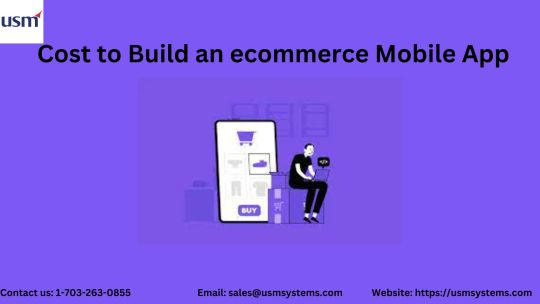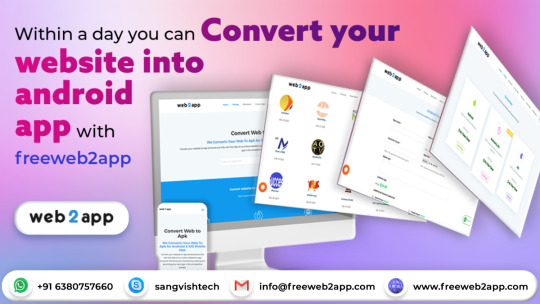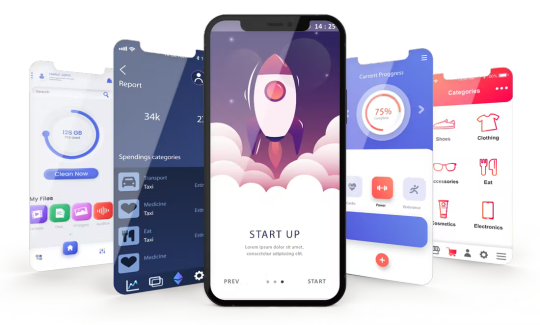#android app builder
Explore tagged Tumblr posts
Text
🌟 Embracing the Future of Mobile App Development 🌟
Hey Tumblr fam! 📱✨ As we dive into 2024, the world of mobile app development is buzzing with exciting trends that are shaping the way we interact with technology. Here’s a glimpse into what’s on the horizon:
AI & Machine Learning: Apps are getting smarter, thanks to AI and ML, offering personalized experiences and predictive insights.
5G Revolution: With 5G, expect faster speeds and enhanced capabilities for apps, paving the way for immersive AR, VR, and IoT applications.
Cross-Platform Development: Tools like Flutter and React Native make it easier to develop apps that work seamlessly across different devices and platforms.
AR & VR Experiences: From virtual shopping to interactive gaming, AR and VR are transforming how users engage with apps.
Blockchain Integration: Enhancing security and transparency in mobile apps through decentralized solutions.
IoT Connectivity: Apps that connect with smart devices, offering seamless control and monitoring.
Progressive Web Apps (PWAs): Combining the best of web and mobile apps for a responsive and engaging user experience.
Enhanced Mobile Security: Biometric authentication, encryption, and secure APIs to protect user data.
Wearable Tech Integration: Apps that sync with smartwatches and fitness trackers, offering personalized health insights.
Voice-Activated Interfaces: Hands-free interaction with apps through virtual assistants like Siri and Alexa.
💡 Want to dive deeper into the world of mobile app development? Check out this insightful article on Warticles.com. It covers the top 10 key features to consider when choosing the best mobile app builder.
And if you’re thinking of building your own app, explore MageNative- Mobile App Builder on Shopify! It’s packed with features to streamline your development process.

Stay tuned for more updates and insights on technology trends. Follow for the latest in mobile app development and beyond! 📲💬
1 note
·
View note
Text

Develop Android Apps without Coding | Nocodesolutions Academy
Nocodesolutions Academy makes it simple to develop Android apps without coding. Our intuitive platform helps you create custom apps quickly and easily, no technical expertise needed. Start building your app today! For more information, please visit: https://www.nocodesolutions.academy/cms/
#free app development software#no code app builders#create app without coding in new york#develop android apps without coding
0 notes
Text

0 notes
Text

Learn About The Essential Stages Of Mobile App Development
Check out the essential stages of mobile app development. Reach out to the best and easy custom mobile app builder and gather insights on mobile app builder apps.
#ai mobile app builder#best mobile app builder#mobile app builder#best mobile app builders#custom mobile app builder#easy mobile app builder#ios mobile app builder#android mobile app builder#mobile app builder for ios and android#mobile app builder online#mobile app builder apps#mobile application development platform#best platform to build mobile app#build a mobile app
0 notes
Text
Unlocking Success: The Ultimate Guide to Shopify Mobile App Builder for Your E-Commerce Business

In today's fast-paced digital world, mobile commerce is rapidly becoming the cornerstone of successful e-commerce businesses. With an increasing number of consumers shopping via smartphones, having a mobile app for your Shopify store is no longer a luxury—it's a necessity. A mobile app not only enhances the shopping experience but also strengthens customer loyalty and boosts sales. But how do you go about creating an app that not only represents your brand but also delivers a seamless user experience? This is where a Shopify mobile app builder comes into play. This guide will explore how to unlock the full potential of your e-commerce business using a Shopify mobile app builder.
Understanding Shopify Mobile App Builders
What is a Shopify Mobile App Builder?
Definition and Overview
A Shopify mobile app builder is a tool or platform that allows you to create a mobile app for your Shopify store without the need for extensive coding or technical expertise. These builders are designed to integrate seamlessly with your existing Shopify store, enabling you to transform your online shop into a fully functional mobile app.
Benefits of Using a Shopify Mobile App Builder
Cost-Effective: Compared to custom app development, Shopify mobile app builders are a more affordable option, saving both time and money.
Easy to Use: With drag-and-drop functionality and pre-designed templates, these builders make it easy for non-technical users to create a professional-looking app.
Seamless Integration: They integrate directly with your Shopify store, allowing you to sync products, inventory, and orders in real-time.
Key Features of Shopify Mobile App Builders
User-Friendly Interface
Drag-and-Drop Functionality
The drag-and-drop functionality allows you to customize your app’s layout and design easily. This feature is particularly beneficial for users who do not have coding knowledge but want to create a visually appealing app.
Pre-Built Templates
Pre-built templates offer a head start, providing you with a variety of design options that can be customized to match your brand's aesthetics. This helps in speeding up the development process and ensures a professional look for your app.
Real-Time Synchronization
Inventory Management
One of the most significant advantages of a Shopify mobile app builder is its ability to sync with your Shopify store in real time. This ensures that your inventory is always up-to-date, reducing the risk of overselling or stockouts.
Order Management
Real-time synchronization also extends to order management. Orders placed through the mobile app are instantly reflected in your Shopify dashboard, streamlining your operations and providing a seamless experience for your customers.
Customization Options
Branding
Customization options allow you to incorporate your brand's colors, logos, and other elements into the app, ensuring consistency across all platforms. This is crucial for maintaining brand identity and customer loyalty.
Personalization Features
Many Shopify mobile app builders offer personalization features, such as product recommendations based on user behavior. Personalization can significantly enhance the shopping experience, leading to higher conversion rates.
Push Notifications
Engagement
Push notifications are a powerful tool for re-engaging customers. You can use them to notify users about new product launches, special offers, or abandoned cart reminders, encouraging them to return to your app.
Increased Sales
Well-timed push notifications can drive impulse purchases, significantly boosting your sales. They are an effective way to communicate with your customers directly and keep your brand top-of-mind.
Analytics and Reporting
Performance Metrics
Analytics and reporting tools allow you to track the performance of your app, including user behavior, sales, and other key metrics. This data is invaluable for making informed decisions and optimizing your app for better results.
Customer Insights
Understanding your customers' preferences and shopping habits is crucial for tailoring your offerings. The insights gained from analytics can help you refine your marketing strategies and enhance the overall user experience.
Steps to Build a Shopify Mobile App
Choose the Right Shopify Mobile App Builder
Evaluate Features
When selecting a Shopify mobile app builder, evaluate the features offered by different platforms. Look for builders that provide the customization options, integrations, and support you need to create a successful app.
Consider Pricing
Compare the pricing plans of various app builders. While it's important to stay within your budget, also consider the value provided by the builder in terms of features and support.
Customize Your App
Design the Layout
Use the drag-and-drop functionality to design the layout of your app. Ensure that the design is user-friendly and aligns with your brand's identity.
Add Branding Elements
Incorporate your brand's colors, logos, and other elements into the app. This will help in creating a consistent brand experience across all platforms.
Personalize User Experience
Leverage the personalization features offered by the builder to create a tailored shopping experience for your users. This can include product recommendations, personalized notifications, and more.
Integrate Essential Features
Product Catalog Integration
Ensure that your app integrates seamlessly with your Shopify store's product catalog. This will allow you to display your products accurately and update them in real time.
Payment Gateway Integration
Integrate your app with secure payment gateways to provide a smooth checkout experience. Ensure that the payment process is quick, easy, and secure to build trust with your customers.
Test and Launch
Beta Testing
Before launching your app, conduct beta testing to identify any bugs or issues. This will help you refine the app and ensure it provides a seamless user experience.
Gather Feedback
Gather feedback from your beta testers and make necessary adjustments. This will help you launch an app that meets your customers' needs and expectations.
Launch on App Stores
Once you are satisfied with the app, launch it on the Apple App Store and Google Play Store. Ensure that your app listing is optimized with relevant keywords, descriptions, and visuals to attract downloads.
Strategies for Maximizing Success
Promote Your Mobile App
In-Store Promotion
Promote your app directly on your Shopify store. Use banners, pop-ups, and other promotional tools to encourage your website visitors to download the app.
Email Marketing
Leverage your email marketing campaigns to promote your app. Include download links and highlight the benefits of using the app, such as exclusive discounts or a better shopping experience.
Social Media Promotion
Use your social media platforms to spread the word about your app. Engage with your followers and offer incentives, such as discounts or giveaways, to encourage them to download and use the app.
Monitor and Optimize Performance
Regular Updates
Regularly update your app to fix bugs, add new features, and improve performance. This will keep your app relevant and ensure that it continues to meet your customers' needs.
Analyze User Behavior
Use the analytics tools provided by your Shopify mobile app builder to monitor user behavior. This data can help you identify areas for improvement and optimize your app for better results.
Conclusion
Building a mobile app for your Shopify store using the best no-code mobile app builder is a powerful way to enhance your e-commerce business. By selecting the right platform, customizing your app to reflect your brand, and integrating essential features, you can create a seamless shopping experience for your customers. Additionally, by promoting your app effectively and continuously optimizing its performance, you can drive more engagement, increase sales, and unlock the full potential of your e-commerce business. With the right strategies in place, your Shopify mobile app can become a key driver of success in the competitive world of mobile commerce.
#shopify mobile app builder#e-commerce mobile app builder#online store appbuilder#shopify mobile app template#integrate shopify with android app#mobile app builder for shopify#best shopify mobile app builder
0 notes
Text
How to Create a Mobile App Without Coding Skills: A Beginner's Guide

In today's tech-savvy world, having a mobile app for your business, hobby, or personal use has become increasingly popular. However, the misconception persists that developing an app requires advanced coding skills and technical expertise. Fortunately, thanks to advancements in technology, creating a mobile app builder has become more accessible to individuals without coding knowledge. In this beginner's guide, we'll explore the step-by-step process of creating a mobile app without writing a single line of code.
Understanding the Basics
Before diving into app development, it's essential to grasp the fundamentals. A mobile app is a software application designed to run on mobile devices such as smartphones and tablets. These apps can serve various purposes, from entertainment and productivity to e-commerce and social networking.
Why Create a Mobile App?
The benefits of having a mobile app are manifold. For businesses, it can enhance customer engagement, boost brand visibility, and generate additional revenue streams. For individuals, it provides a platform to showcase creativity, share knowledge, or simply solve everyday problems more efficiently.
Common Misconceptions
One of the most significant misconceptions about app development is that it requires extensive coding skills. While coding certainly plays a crucial role in traditional app development, there are now alternative methods that allow individuals to create apps without coding.
Choosing the Right Approach
When it comes to creating a mobile app without coding skills, there are several approaches you can take. Each approach has its own set of pros and cons, so it's essential to choose the one that best aligns with your goals and expertise.
App Builders and Platforms
App builders or app development platforms are online tools that provide a user-friendly interface for creating mobile apps without coding. These platforms typically offer drag-and-drop functionality, pre-designed templates, and built-in features that make app development accessible to beginners.
No-Code Development Platforms
No-code development platforms take app development a step further by eliminating the need for any programming knowledge whatsoever. These platforms typically use visual interfaces and pre-built components to enable users to create fully functional apps with minimal effort.
Planning Your App
Once you've chosen the approach that best suits your needs, it's time to plan your app. This involves defining its purpose, identifying its target audience, and outlining its features and functionalities.
Define Your App's Purpose
Before you start building your app, ask yourself: What problem does it solve? What value does it provide to users? Clearly defining your app's purpose will help guide its development and ensure that it meets the needs of your target audience.
Identify Your Target Audience
Understanding your target audience is key to creating a successful app. Consider factors such as demographics, interests, and pain points to tailor your app to the needs and preferences of your target users.
Outline Your App's Features
Make a list of the features and functionalities you want your app to have. Start with the essential features that are core to your app's purpose, then consider additional features that could enhance the user experience.
Designing Your App
The design of your app plays a crucial role in its success. A well-designed app not only looks good but also provides a seamless and intuitive user experience.
User Interface (UI) Design
The UI design encompasses the visual elements of your app, including layout, colors, typography, and graphics. Aim for a clean and intuitive design that makes it easy for users to navigate and interact with your app.
User Experience (UX) Design
UX design focuses on the overall experience of using your app, from the moment users open it to when they complete their desired actions. Pay attention to factors such as usability, accessibility, and performance to ensure a positive user experience.
Prototyping and Testing
Before finalizing your app design, create prototypes to visualize how it will look and function. Conduct usability testing with real users to gather feedback and identify any usability issues or areas for improvement.
Building Your App
Once you have a clear plan and design for your app, it's time to start building it using your chosen development platform.
Drag-and-Drop Interface
If you're using an app builder or no-code platform, take advantage of the drag-and-drop interface to add elements, customize layouts, and configure functionalities. Experiment with different features and settings to achieve the desired look and functionality for your app.
Customization Options
Most app development platforms offer a range of customization options, allowing you to personalize your app to reflect your brand identity and style. Take the time to explore these options and make your app stand out from the crowd.
Integration with Third-Party Services
Many app development platforms allow you to integrate your app with third-party services and APIs to add additional functionalities. Explore the available integrations and consider how they can enhance your app's features and capabilities.
Testing and Launching Your App
Before releasing your app to the public, it's essential to thoroughly test it to ensure it functions correctly and meets the needs of your users.
Beta Testing
Invite a small group of beta testers to try out your app and provide feedback. Look for any bugs, glitches, or usability issues that need to be addressed before the official launch.
App Store Submission
Once you're confident that your app is ready for release, submit it to the appropriate app stores (e.g., Apple App Store, Google Play Store). Follow the submission guidelines and requirements to ensure a smooth approval process.
Marketing and Promotion
Launching your app is just the beginning. To attract users and drive downloads, invest in marketing and promotion efforts such as social media campaigns, app store optimization (ASO), and influencer partnerships.
Conclusion
Creating a shopify mobile app builder without coding skills may seem daunting at first, but with the right tools, resources, and guidance, it's entirely achievable. Whether you're a business owner looking to expand your reach or an individual with a creative idea, the opportunities for app development are endless. By following the steps outlined in this beginner's guide, you can turn your app idea into reality and bring your vision to life. So what are you waiting for? Start building your dream app today!
#best no code mobile app builder#white label mobile app builder#no code mobile app builder#mobile app builder#best mobile app builder#shopify mobile app builder#ecommerce mobile app builder#online store app builder#shopify mobile app template#integrate shopify with android app#mobile app builder for shopify#best shopify mobile app builder
0 notes
Text
#shopify mobile app#shopify mobile app builder#shopify mobile#shopify android app#shopify reseller program#shopify ios app#create app for shopify store
0 notes
Text
Advancements and Evolution in Mobile App Development Technologies and Trends

For companies aiming to engage consumers successfully and offer seamless experiences in the changing world of mobile app development today, staying on top of the trends is essential. The environment of mobile app development is changing as we go into the future thanks to a number of new trends and technologies. Let's examine closely in this article the following five crucial aspects that are spurring innovation in this industry:
Artificial Intelligence (AI) and Machine Learning (ML)
Recently, artificial intelligence and machine learning fields have influenced the creation of smartphone apps. With the help of these technologies, applications may provide individualized experiences while learning from user behaviour and preferences. Here are some ways that AI and ML are changing the world of app development:
READ MORE
#App development company#Mobile app development solutions#iOS app development#Mobile app design#Android app development#ui ux design#Static Web Design#dynamic website development#Website Builder
0 notes
Text
How to Create a Resume on Mobile
How to Create a Resume on Mobile In today’s digital age, it’s more common than ever to apply for jobs online. This means that you need to have a resume that is mobile-friendly and easy to read on a small screen. Creating a resume on mobile can be a challenge, but it’s definitely possible. Here are a few tips: Use a mobile-friendly resume builder. There are a number of online resume builders…

View On WordPress
#create resume on mobile#create resume on smartphone#free resume builder for mobile#how to format resume on mobile#how to make a professional resume on mobile#make resume on android#make resume on iphone#make resume on phone#resume builder app#resume templates for mobile#write resume on phone
0 notes
Video
youtube
New40K Warhammer 40,000 App thoughts and reaction #tabletopgaming
#youtube#warhammer 40k#warhammer 40 000#new 40k#tabletop gaming#miniature wargaming#app#list builder#army builder#battle forge#ios#android#way of the brush#reaction#first impressions#thoughts
0 notes
Text
Cost To Develop An Android Ecommerce-App & Features

The popularity of creating mobile apps has increased recently. It is evident in every industry sector, including eCommerce, from healthcare to retail. Nowadays, people depend more and more on smartphone applications for nearly everything, such as food delivery, online shopping, and binge-watching TV shows or movies.
Mobile apps help expand brand awareness, improve market communication, higher conversion rates, and more. eCommerce apps account for 72.9% of the mobile app market, according to Statista. As a result, several business owners from different industries are investing in developing eCommerce apps.
People spend most of their time on smartphones and use multiple apps every day. Therefore, creating an eCommerce app can benefit your business as it will create brand awareness. Moreover, it can enhance user interaction due to 24*7 availability.
Every retailer should inquire about project costs before selecting an eCommerce app development provider.On his blog, he lists the eCommerce app development features that cost the least.
Note: To build an ecommerce app, you can contact Android application development companies in Virginia
Let’s go through the obvious business benefits of using an eCommerce mobile app-
Effective Marketing- ECommerce mobile app serves as a cost-effective and highly effective marketing tool. It not only meets the shopping needs of your customers but also allows you to come up with app-based discounts and real-time promotional notifications. In a sense, an eCommerce app for Android and iOS can boost customer loyalty.
Information Collection- The eCommerce app requires the user’s email ID and social media account details along with their contact numbers. As a result, eCommerce companies can obtain valuable data from their existing and potential customers.
Improved collaboration- A customized eCommerce mobile app facilitates secure and real-time collaboration between your company and customers. In addition to searching or shopping anytime, the app allows your customers to ask questions or give advice 24/7.
Spread Brand Awareness- Mobile app development company in USA creates an app that fits your business model, thus helping you increase your brand visibility. E-commerce apps with a personalized experience can be an excellent tool for effective communication with customers.
While eCommerce apps offer many benefits to businesses and startups, still many business people have no idea about the cost of developing eCommerce apps. Let’s dig deeper into this in this blog.
Selecting the Features First
Prioritizing your options wisely is essential when creating an e-commerce app because they have a big impact on the project's overall cost. Giving the necessities top priority and gradually introducing the newest items through features will help you get the most out of your money.
Customer onboarding: The capacity to sign up customers is among the most crucial components of a mobile commerce platform. You can allow users to join up using their social network or email credentials or provide them guest access. To enhance the user experience and speed up app navigation, a client login page or simple instructions are advised.
Any mobile commerce app must include a search feature with numerous straightforward filtering options. Users should be able to locate exactly what they're looking for by using a variety of filters and search phrases.
Push notifications are a crucial component of e-commerce platforms since they can periodically send customers alerts, SMS messages, and promotions.
The majority of customer engagement and business conversion happens in a product catalog. As a result, a user-friendly, logically organized product page must be created.
User-Generated Content: People should be given the chance to vote, comment, and upload their own tales.
Unified payment system: Several quick and secure payment methods should be provided.
Users can put the things they want to buy in a cart.
In order to provide customers the flexibility and confidence they deserve, they must be able to verify the progress of their orders and deliveries. Users ought to have access to an order summary and a delivery timeline.
Two examples of more-common advanced features include voice chatbot support and GPS position monitoring. But it's crucial to keep in mind that these sophisticated features could significantly increase the price of first production development.
As a result, give the foundational information top attention and build up to more complicated ideas based on user input. Gradual development is the best method for producing profitable e-commerce software without going over budget.
What it will cost to create an e-commerce app in 2023
He asked how much a smartphone app costs. You are in the proper location. The average cost to create an ecommerce app is between $20,000 and $40,000. A number of variables, such as complexity, the number of platforms utilized for development, features, design, developer location, and ongoing support and maintenance of the app, can have a considerable impact on the price of an eCommerce app. To acquire a precise cost estimate, grasp the details better.
The size of the business
The quantity of goods sold and the number of clients a specific e-commerce app serves determine the app's size.
Little
A small e-commerce business has limited inventory and few customers that require limited hardware and good UI/UX design. An eCommerce mobile app costs anything between $300- $16000.
It is an average business
If the e-commerce app has a suitable variety of features and regular customers, then the business needs a mid-range app with some complex features. The cost of building a mid-sized e-commerce app ranges from $16,000- $35,000.
Related Article: Androidapp development company in Tacoma
Business at the corporate level
To manage massive stocks, several sales channels, and countless brands, an app with this many features and users needs a scalable solution. It's also crucial that CRM and ERP are integrated. Custom enterprise-level commerce software can be produced for as little as $40,000. The development of apps for the e-commerce sector falls within the corporate business category because it includes thousands of suppliers who provide a variety of services to millions of customers.
Place
The choice of platform has a significant impact on the overall cost of an e-commerce app. While Android has a large user base around the world, iOS is more popular in North America. An e-commerce app should be built according to targeted user base preferences that help you move towards financial profitability. When you build an Android eCommerce app, it costs about $25,000. On the other hand, developing an iOS eCommerce application costs $20,000. Building the app on both major platforms brings in a total of $45,000.
Author: I’m Anita Basa, a fascinating Technical Content writer currently working at USM Business Systems. Interested to know about technology updates. Mobile App Development, IoT, Artificial Intelligence, Machine Learning, IOS, and Technology-related content Get connected with me on Linkedin
#Ecommerce#ecommerceappdevelopment#ecommerceapp#ecommerce application development#ecommerce app builder#Ecommerce App Development#android app development#iOSAppDevelopment#mobileappdevelopmentusa#MobileAppDevelopmentCompanies#iOS App Development Companies#populer#Amazon#flipkart#ajio#myntra#Onlineshopping#online shops offer#online#business#onlinebusines#onlinebusinesses#marketing#enterprenuership#enterpreneur#sales#forsale#buying
1 note
·
View note
Text
What is the Work of a No-Code App Development Builder?

No-Code App Development Builders allow individuals to create applications without having to write code. These builders work by providing users with a graphical interface that allows them to create and customize their applications through drag-and-drop functionality, visual editors, and pre-built templates.
The process typically involves the following steps:
The process typically involves the following steps:
Choosing the type of application you want to build: Users can choose from various app types, such as e-commerce, social media, or productivity apps.
Designing the user interface (UI): Users can use pre-built templates or create their own UI by selecting and arranging different components, such as buttons, text fields, images, and more.
Configuring the app's Functionality: Users can choose from a variety of pre-built functionalities or add their own custom features using a visual editor.
Testing The App: Once the app is built, users can test it on different devices to ensure that it works properly.
Deploying the App: Finally, users can deploy their app to various platforms, such as the web, iOS, and Android.
No-Code App Development Builders have become increasingly popular due to their ease of use and accessibility. They allow individuals with little or no coding experience to create functional applications quickly and at a lower cost than traditional app development methods.
#no code#aap development#application development#ios apps#android app developers#no code app builder
0 notes
Photo

Within a day you can convert your website into android app with Freeweb2app Visit: https://freeweb2app.com/createapp
#freeweb2app#turn website into android app#website to android app#web to android app#web to app#turn your website into mobile app#free web2app#web to app free#website2apk builder online tool#website2app
0 notes
Text
Appsxprs Mobile Apps Builder: Create Your Own Mobile App Without Coding
In the digital age, mobile apps have become an integral part of our lives. From ordering food to booking a cab, there is an app for almost everything. As a result, businesses are now seeking ways to have their own mobile app. However, building a mobile app from scratch requires technical knowledge, which many people lack. This is where Appsxprs comes into play. Appsxprs is a mobile app builder…

View On WordPress
#android apps builder#apps bilder#apps builder cms#apps builder companies#apps builder concepto#apps builder free#apps builder pro oto#apps builder software#power apps ai builder#power apps ai builder pricing
0 notes
Text
A Step-by-Step Guide to iOS Application Development
iOS application development is one of the most popular and efficient ways to develop custom mobile applications. The entire process of iOS application development involves several stages, from conceptualization to deployment. Each stage requires different skills and tools.
If you want to design and develop iOS applications, you need XCode as a graphical interface for writing applications that includes tools, compilers, frameworks, and iOS SDK.
#android app development services#iphone application development company#hire android app developer#android app development#android mobile app development company#mobile app development in usa#mobile app development cost#mobile app development company#ios app builder#mobile app development for business#blockchain app development#web development company in usa#custom android app development
0 notes
Text
Twine/SugarCube ressources
Some/most of you must know that Arcadie: Second-Born was coded in ChoiceScript before I converted it to Twine for self-publishing (for various reasons).
I have switched to Ren'Py for Cold Lands, but I thought I would share the resources that helped me when I was working with Twine. This is basically an organized dump of nearly all the bookmarks I collected. Hope this is helpful!
Guides
Creating Interactive Fiction: A Guide to Using Twine by Aidan Doyle
A Total Beginner’s Guide to Twine
Introduction to Twine By Conor Walsh (covers Harlowe and not SugarCube)
Twine Grimoire I
Twine Grimoire II
Twine and CSS
Documentation
SugarCube v2 Documentation
Custom Macros
Chapel's Custom Macro Collection, particularly Fairmath function to emulate CS operations if converting your CS game to Twine
Cycy's custom macros
Clickable Images with HTML Maps
Character pages
Character Profile Card Tutorial
Twine 2 / SugarCube 2 Sample Code by HiEv
Templates
Some may be outdated following Twine/SugarCube updates
Twine/Sugarcube 2 Template
Twine SugarCube template
Twine Template II
Twine Template by Vahnya
Sample Code and more resources
A post from 2 years ago where I share sample code
TwineLab
nyehilism Twine masterpost
How to have greyed out choices
idrellegames's tutorials
Interactive Fiction Design, Coding in Twine & Other IF Resources by idrellegames (idrellegames has shared many tutorials and tips for Twine, browse their #twine tag)
How to print variables inside links
How do I create a passage link via clicking on a picture
App Builder
Convert your Twine game into a Windows and macOS executable (free)
Convert your Twine game into a mobile app for Android and iPhone (90$ one-time fee if memory serves me right) // Warning: the Android app it creates is outdated for Google Play, you'll need to update the source code yourself
213 notes
·
View notes